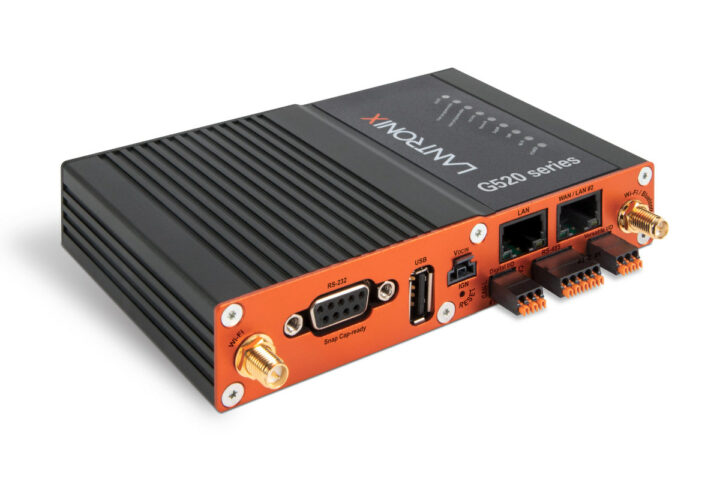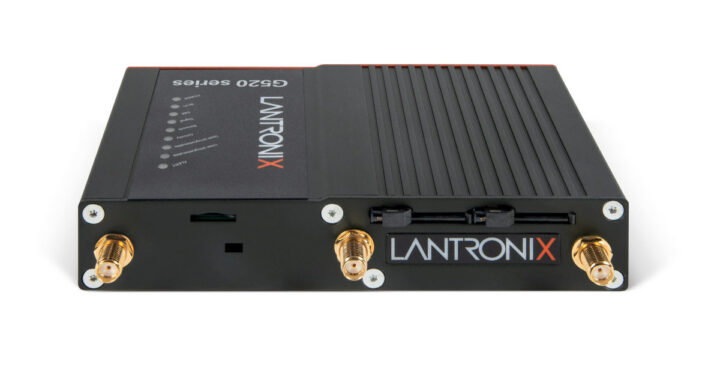Lantronix G520-series 4G LTE Cat 4 and 5G cellular gateways are designed to address challenges in Industry 4.0, security, and transportation markets with three/four separate gateways all based on an unnamed ARM926EJ-S-based CPU running at 600 MHz that’s most likely Microchip SAM9X60 processor introduced in 2020.
All gateways are from the same base with variation for specific markets:
- G526 Industrial Gateway with LTE Cat 4 Ethernet, Serial, I/O, Fieldbus conversion, and other industrial protocols
- G527/G528 Security Gateway with LTE Cat 13 or 5G, built-in cryptographic secure element and PSE-PoE
- G528 Transportation Gateway (coming soon) with LTE Cat 4, GNSS, accelerometer, CAN Bus reading, and other tracking features
 Lantronix G520-series specifications:
Lantronix G520-series specifications:
- SoC – ARM926EJ-S-based processor running at 600 MHz with 32 KB instruction cache and 32KB data cache
- System Memory – 256MB DDR2 SDRAM
- Storage – 8MB SPI flash for OS, 256MB parallel NAND flash, MicroSD slot, or USB flash drive for user data storage
- Connectivity
- Cellular options
- LTE Cat. 4 with 3G and, depending on the regional variant, 2G fall-back modes on industrial pack
- LTE Cat 13 (uplink) / 7 (downlink) with 3G fall-back mode on security pack
- 5G, Sub-6 GHz with both LTE Cat. 13 (uplink) / Cat. 20 (downlink) and 3G fall-back modes
- Dual SIM / Single standby via two mechanically secure mini-SIM holders OR MFF2 SIM(s) combination of (i) ‘MFF2 + mini’; or (ii) ‘mini + MFF2’; or (iii) ‘MFF2 + MFF2’ SIMs, substituted for the standard two mini-SIM trays.
- Wi-Fi & Bluetooth
- 2T2R Wi-Fi 5 via an RP-SMA antenna connector
- Bluetooth 5.1 via Wi-Fi’s rightmost RP-SMA antenna connector
- Optional 2T2R WiFi6/6E
- Dual 10/100M Ethernet with 1x LAN RJ45 port and 1x WAN RJ45 port user-reconfigurable as second LAN port
- GNSS
- Qualcomm IZat location services, Gen. 8c/9c or u-blox M8 (transport pack)
- Concurrent GPS and GLONASS (security gateway 5G model)
- Cellular options
- USB – 1x USB Type-A host port
- Serial
- RS-232 full via DB9 connector
- RS-485 via 5-pin COMBICON header
- I/Os
- 2x IOs with common ground via a 3-pin COMBICON header and a tool-less plug configurable as analog input or digital output
- Input: 0V ~ 2.5V DC (Zero); 3V to 50V DC (One)
- Output: open collector; 200 mA max.; 50V DC max.
- Sensor – 3-axis accelerometer (STMicroelectronics LIS331DLH)
- HW Security – Microchip ATECC608 secure element on security variant
- Misc
- 9x LEDs for power, connectivity, some user-programmable
- RTC with 100-day data retention period, approximately 15 mWh lithium manganese battery (not functional below -20°C)
- Power Supply
- Input voltage – 10.8 to 60V DC via 3-pin Nano-Fit header
- PSE-PoE+ for Security pack only (30W per LAN port)
- “Last Gasp” with about 100 seconds of power via 2 96 mWh Li-ion batteries (not functional below -10°C)
- Digital Input (Ignition) on the third pin of the 3-pin header
- Dimensions – 131.5 x 81.27 x 25 mm without connectors (Brushed aluminum alloy enclosure)
- Weight – About 300 grams
- Temperature & Humidity
- Operating: -30°C tp +70°C; up to 95% RH
- Storage: -40°C to +85 °C; up to 95% RH
 Each gateway comes pre-configured with Lantronix’s ConsoleFlow cloud-based device management and comes with a web-based user interface to configure networking (WiFi, Ethernet, Cellular, VPN, routing…), security (firewall, VLAN, SIM pin, etc..) , and industrial communication protocols that include EtherCAT, DLMS client, DNP3 Outstation, Modbus master, IEC104 slave, and IEC 101 master.
Each gateway comes pre-configured with Lantronix’s ConsoleFlow cloud-based device management and comes with a web-based user interface to configure networking (WiFi, Ethernet, Cellular, VPN, routing…), security (firewall, VLAN, SIM pin, etc..) , and industrial communication protocols that include EtherCAT, DLMS client, DNP3 Outstation, Modbus master, IEC104 slave, and IEC 101 master.
While not specified in the description, Lantronix G520-series cellular IoT gateways clearly run OpenWrt as the company offers a G520 SDK to create custom packages and build custom firmware images, and the documentation assumes that “you have a computer running a supported Linux distribution (or VM) and are familiar with the OpenWrt build system and the Lantronix Web Admin for configuring G520 series devices.”
G520 Industrial (G526) and G520 Security (4G LTE: G527, 5G: G528) gateway are available now, while G520 Transport (G529_) is coming later this year. Pricing has not been publicly disclosed, and more details may be found in the press release and on the product page.
Via LinuxGizmos

Jean-Luc started CNX Software in 2010 as a part-time endeavor, before quitting his job as a software engineering manager, and starting to write daily news, and reviews full time later in 2011.
Support CNX Software! Donate via cryptocurrencies, become a Patron on Patreon, or purchase goods on Amazon or Aliexpress




